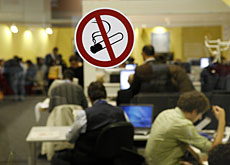Parliament prepares last rites for smokers

Switzerland is to consider tough new restrictions on smoking in public places, which would bring it into line with other European countries.
Parliament is expected to begin discussions this week on a nationwide law to protect people from passive smoking in the workplace, restaurants and bars.
A quick poll on the streets of the capital Bern appears to confirm the results of several surveys about people’s attitude towards smoking.
Out of a dozen respondents, only two flatly rejected a smoking ban in public areas. The majority came out in favour – some with cigarettes in their hands.
“By all means smoking in the workplace should be outlawed. I’m a smoker, on and off, but I definitely prefer to sit with non-smokers at work or in a restaurant,” said Heike Rothenbühler.
She would like to see special lounges for those who need their regular intake of nicotine. Her view is shared by most of those interviewed by swissinfo on a sunny autumn afternoon.
Public mood
The House of Representatives is aware of the public’s views and looks set to take action accordingly when it launches its parliamentary debate on Wednesday.
Even Toni Bortoluzzi, a member of the rightwing Swiss People’s Party and outspoken opponent of a ban on smoking, acknowledges that he stands to lose the battle. But it is a matter of principle and personal responsibility for him.
“It’s wrong to ban the use of a legal product. The state interferes in private affairs when it defines the rules of tobacco consumption in a privately owned restaurant or a bar,” he said.
No new law is necessary, according to Bortoluzzi. The problem could be solved with common sense, respect and tolerance, he says.
Nevertheless, he prefers having the same rules for the whole country rather than a legal patchwork of different regulations across Switzerland’s 26 cantons. Until now it has been up to the cantons to decide on anti-smoking measures.
Tourism
For Ruth Humbel of the centre-right Christian Democrats, national legislation is not only in the interest of hotels and restaurants, but also helps boost Switzerland’s image as a tourist destination.
Humbel, who is campaigning for a ban, says the situation in neighbouring countries has influenced people’s perception of smoking.
“To everyone’s surprise, Italy became one of the first countries to impose restrictions. France followed suit, apparently belying its reputation as a nation of laidback connoisseurs,” she said.
The main reason for changing attitudes is increased awareness of the health risks from smoking.
Humbel and Bortoluzzi agree that there is indisputable scientific evidence of the damaging effect of inhaling second-hand smoke.
Courts
Humbel also points out that there are concerns that a wave of lawsuits by cancer patients could spill over from the United States.
“Money usually makes people think twice,” she said, referring to US courts ordering the payment of huge sums in compensation.
The new Swiss draft law bans smoking in public buildings, hospitals, schools, museums, theatres, cinemas and public transport as well as in restaurants and bars. But separate well-ventilated rooms for smokers would be allowed.
The new legislation would take effect from 2009 at the earliest.
For its part, the Federal Health Office says non-smokers in Switzerland are now more outspoken about proclaiming their right to clean air. It says this is partly the result of prevention efforts over the past six years.
“We hope the new law will lead to fewer cases of illnesses related to second-hand smoke, an improvement in the health of people working in the catering business and a further drop in the number of smokers in Switzerland,” says Health Office spokeswoman Karine Begey.
swissinfo, Urs Geiser
According to a government report, around 400 people in Switzerland die every year from the effects of second-hand smoke.
This costs the economy about SFr500 million a year ($426 million).
Around 29% of the Swiss population smoke, according to 2007 figures.
A recent survey by Zurich University found a majority of people aged 14-65 are in favour of a general smoking ban in bars and restaurants.
The southern Italian-speaking Ticino region – bordering Italy – became the first to introduce a smoking ban in public places in April, following a vote in 2006.
Other Swiss cantons have followed or are preparing proposals for a similar step.
Smoking has been forbidden on the entire Swiss public transport network since December 2005.
The Republic of Ireland was the first European Union country in 2004 to introduce a smoking ban at the workplace, including restaurants and pubs.
At least 18 other European countries, including France, Italy and Britain, have imposed similar bans. Some allow for the setting up of well-ventilated rooms, so-called fumoirs, for smokers.
In Germany the different states are expected to pass legislation on smoke-free restaurants by the middle of next year, in line with EU recommendations.
Under US law individual states and local authorities can decide on smoking bans. More than half of the states have a strict non-smoking policy for restaurants and/or bars.
Canada introduced a federal law aimed at protecting non-smokers at the workplace in 1986. It allows for the installation of fumoirs.

In compliance with the JTI standards
More: SWI swissinfo.ch certified by the Journalism Trust Initiative












You can find an overview of ongoing debates with our journalists here . Please join us!
If you want to start a conversation about a topic raised in this article or want to report factual errors, email us at english@swissinfo.ch.